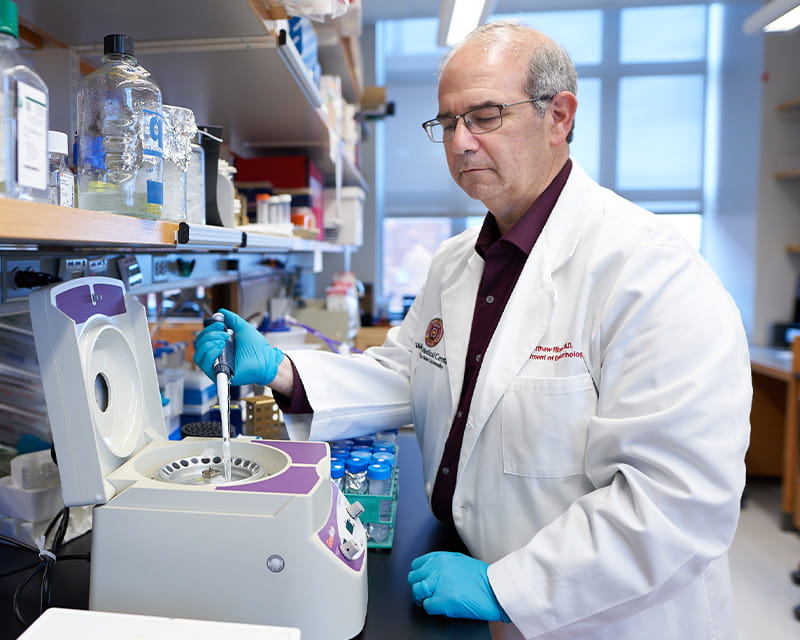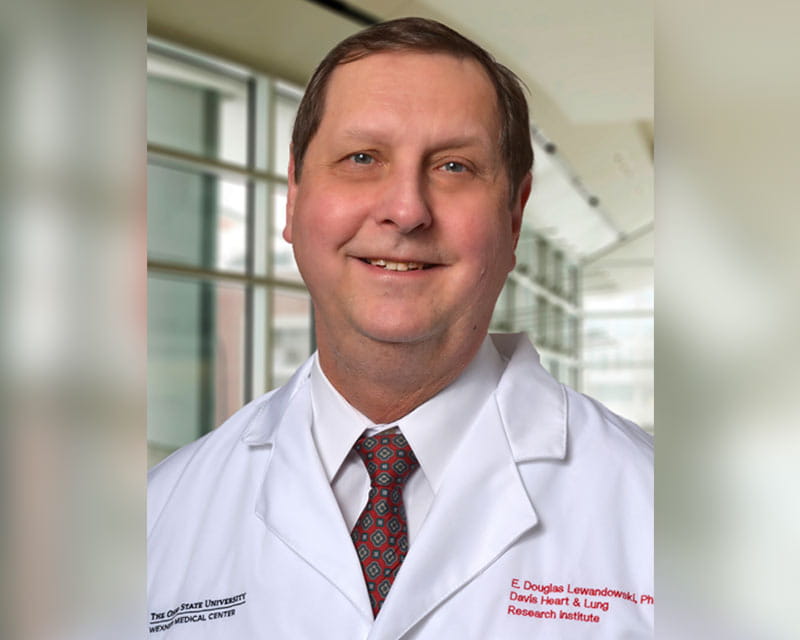
Studying “brake failure” in thyroid cancer metastasis
 It was 2007 when E. Douglas Lewandowski, PhD, now a professor in the Division of Endocrinology, Diabetes and Metabolism at The Ohio State University College of Medicine, showed that a key enzyme CPT1a — typically present in neonatal hearts — re-emerges to play a prominent role in failing hearts and initiates important organ crosstalk.
It was 2007 when E. Douglas Lewandowski, PhD, now a professor in the Division of Endocrinology, Diabetes and Metabolism at The Ohio State University College of Medicine, showed that a key enzyme CPT1a — typically present in neonatal hearts — re-emerges to play a prominent role in failing hearts and initiates important organ crosstalk.
This enzymatic shift proved to be very important for sending signals throughout the body about problems with the heart’s metabolism.
“Metabolism, for many, is a word that immediately invokes thoughts of obesity and diabetes or exercise. But that’s not how we think about it,” says Dr. Lewandowski, the Jack M. George Chair in Medicine. “Metabolism is a biochemical science of its own — an intricate network of biochemical reactions and molecular events that induce changes to organ function.”
A hallmark of Dr. Lewandowski’s research has been his pioneering work to visualize and measure rates of metabolic activity that occur within intact, functioning organs with nuclear magnetic resonance spectroscopy and stable, non-radioactive isotopes of carbon.
Those findings and subsequent studies have formed the foundation of Dr. Lewandowski’s current-day research on the many processes that comprise metabolism, particularly as it relates to cardiac function. His lab is now focused on the use of supplemental fuels, like ketones and short-chain fatty acids, to help the heart maintain normal contractile function.
One big story in heart failure right now, Dr. Lewandowski says, is the potential benefits of ketones for failing hearts, which can metabolize these relatively small molecules in place of larger fat molecules that typically supply 70% of the heart’s energy for beating.
He and his team have published a number of studies examining the fact that, for some reason, hearts that fail make an early shift away from efficient fat burning.
“We know ketones become fuel for these hearts,” Dr. Lewandowski says. “They bypass all the biochemical steps that keep larger fats from being burned by the failing heart and get into the energy-producing reactions in the heart muscle cell. But maybe there’s nothing magic about ketones. Maybe other similar compounds can also bypass the logjammed processes.”
Recently, Dr. Lewandowski and his team tested this hypothesis and found that short-chain fatty acids were oxidized by failing hearts in even greater ways than ketones.
Their work has pointed to an enzyme — elevated in failing hearts of both humans and animal models — that brings short-chain fatty acids into the heart’s energy metabolism process. He and his team now want to know if the action of this elevated enzyme could be exploited.
“We’re now looking at the potential use of short-chain fatty acids to supplement the ability of failing hearts to generate the energy needed to support constant beating and improved contractile function,” Dr. Lewandowski says.
How the heart stores and uses fats is another focus of Dr. Lewandowski’s lab. “Fat is the primary fuel used to support the pumping function of the heart,” says Dr. Lewandowski. “How it is stored and oxidized is a fine reciprocal balance.”
Most recently, he and his team found that, in failing hearts, fat that would normally come in and out of the heart in a very dynamic way was actually just sitting within and doing very little to regulate normal physiology. They also found that in healthy hearts, this stored fat is important in communicating the metabolic state of the heart to the genetic machinery in the nucleus of the cell. This led to the exciting finding that a healthier gene expression pattern can be stimulated in failing hearts by providing specific beneficial fats.
For his successful and ongoing research career, Dr. Lewandowski will be honored in 2022 with the International Society for Heart Research (ISHR) Research Achievement Award in a ceremony and lecture at the ISHR World Congress held in Berlin, Germany.
Dr. Lewandowski, who has more than 80 peer-reviewed publications, views the ISHR award as a great honor. But there’s more work to do. And he’s excited about what’s to come with his team and collaborators at the Ohio State Wexner Medical Center.
“It’s quite an honor,” says Dr. Lewandowski. “Ohio State has been and continues to be a great place to do basic and translational science that relates to clinical problems. It’s an extremely supportive environment for discovery-based research.”